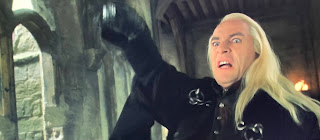Harry frees Dobby with a dirty sock
Lucius Malfoy attempts to murder Harry Potter at the end of the film version of Harry Potter and the Chamber of Secrets.
In what could be considered a significant departure from the original novel, script writer Stephen Kloves chose to expose Malfoy's deepest evil much earlier than Rowling did.
The passage from the novel, which follows Harry's clever way of tricking Malfoy into freeing Dobby, reads as follows:
Lucius Malfoy stood frozen, staring at the elf. Then he lunged at Harry.
"You've lost me my servant, boy!"
But Dobby shouted, "You shall not harm Harry Potter!"
There was a loud bang, and Mr Malfoy was thrown backwards.
 |
| "Avada" shouts Lucius Malfoy, wand in motion |
In the film, on the other hand, Malfoy draws his wand and very clearly utters the word "Avada" before Dobby intervenes. Malfoy's intention is clear: to kill Harry. In front of a witness.
Why the change?
I think it is important to note that, when Rowling published the second novel in 1998, she had not yet invented (or at least had not yet introduced) the concept of the "Unforgivable Curses" and, if my memory serves, the killing curse (the Avada Kedavra) had not yet been uttered in the books. Rowling does not mention the specific curse in The Philosopher's Stone when the murder of Lily and James and Voldemort's failed attempt to kill Harry are discussed.
Rowling introduced the Unforgivable Curses by name and incantation in the fourth novel (2000), The Goblet of Fire, when Moody/Crouch Jr. showed them to the students.
So it is possible that it was Rowling's intention that we read that scene at the end of The Chamber of Secrets as involving Malfoy attempting to murder Harry before she had invented the killing curse. And, as a result, Kloves isn't really changing anything when he added the Avada Kedavara to the scene when he wrote the script for the second movie around 2007.
But I am not sure that's true. I am not sure Rowling's scene depicted a possible attempted murder -- killing someone with one's bare hands is an incredibly difficult, violent act, not one that belongs in a book written specifically for children and young adults. I think it is much more likely that Rowling either had no clear idea of what Malfoy's intentions were -- she knew she would have Dobby intervene so she didn't have to make that decision -- or she saw him as indulging in a fit of rage, with the intention of hurting Harry but not killing him.
If I am correct in this, we have to wonder why Kloves added the intent to murder into the film. By the time he was working on the script, the fourth book had already been published so that Unforgivable Curses had been introduced into the novels so the Avada Kedvara was available... but it's the intent that is important. In the film, Malfoy is willing to commit murder (or the Wizarding World's favourite son, no less) in front of a witness, within a stone's throw of Dumbledore's office.
And, to be frank, that makes no sense to me.
